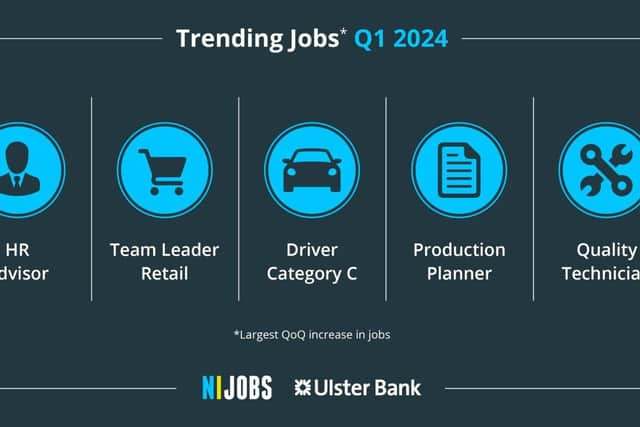Optimism for Local Job Market but Recruitment Challenges Linger
and live on Freeview channel 276
The quarterly report, in partnership with Ulster Bank, tracks hiring activity across Northern Ireland by analysing the platform’s job data, giving an indication of trends alongside the current economic environment and the type of roles jobseekers are searching for most online.
Data reveals a pick-up in hiring, with Q1 posting a quarterly increase of 7% but a decrease of 17% year on year as the job market continues to normalise following a post-pandemic hiring surge. The number of advertised posts is 36% below the post-pandemic peak of Q3 2021 but is 18% above the corresponding quarter in 2019.
Advertisement
Hide AdAdvertisement
Hide AdClose to two-thirds of the thirty-nine employment categories reported an increase in listings in Q1 2024 relative to the last three months of 2023


The vast majority of employment categories still have more job openings listed in Q1 2024 than in the same quarter pre-pandemic (Q1 2019). Those categories with some of the most significant rises in vacancies relative to pre-pandemic include Cleaning +330%, Retail +80%, Logistics +70%, Security +58%, Engineering +52% and Skilled Trades 44%
The employment category recording the largest quarterly rise (numerically) in Q1 2024 was Sales. The number of Sales vacancies increased by 22% q/q and 36% y/y, with the employment category ranked second overall and just ahead of Social Care. Education (+34% q/q) and Human Resources (+22% q/q) both recorded a strong rebound in hiring activity. Logistics and Manufacturing reported the second and third largest numerical increases in job listings in Q1 2024. Both categories saw a 17% q/q rise in vacancies, with Logistics ranked 5th behind Management for overall vacancies.
Sam Dooley – the Country Director of The Stepstone Group Ireland with responsibility for NIJobs said: “A pickup in business momentum across NI is reflected in the increase in hiring activity in the first three months of this year. There is a general sense of confidence and optimism, which could be partially linked to the restoration of the NI Executive in recent months. Jobs are down 17% year on year, but this is to be expected following the spike in recruitment post-Covid, and it’s a pattern we are seeing across all markets.
Advertisement
Hide AdAdvertisement
Hide Ad“In NIJobs, we have seen record volumes of job applications over the first three months of 2024. The high levels of candidate demand speak to the intent of the workforce and their appetite to explore new opportunities. However, the unemployment rate remains exceptionally low, creating additional pressure on local businesses to attract and retain the best talent.


“Our data shows that HR roles have increased by 22% in the last quarter, and this demand indicates that employers are prioritising recruitment strategies for the long term. In an increasingly competitive job market, businesses need to look at their own employer brand proposition to portray an attractive work culture to prospective employees. How people view your business is key to attracting, engaging, developing, and retaining a top-quality team, who are invested in their career and your organisation.
“There has also been a steady increase in Sales roles (+22%, q/q) and Logistics (+17% q/q). Many of the sales roles are within the retail sector with companies including Winemark and Wineflair recruiting sales positions at all levels. In Logistics, growth in Warehouse Operatives, Buyers and Drivers roles tells us that there is positive business sentiment in NI at the moment with an increase in demand and output.”
Ulster Bank’s Chief Economist Richard Ramsey‘s analysis bolsters optimism further: “Recentsurveys of the Northern Ireland economy have pointed to a pick-up in momentum in the first quarter of 2024. Both the Northern Ireland Chamber Quarterly Economic Survey (Q1 2024) and the Ulster Bank Northern Ireland PMI have pointed to increased business activity within Northern Ireland’s private sector. This has also been accompanied by a rise in recruitment activity. However, skills shortages, while perhaps easing slightly, remain a key problem amongst local firms. According to the NI Chamber’s latest survey, 7 in 10 members are still experiencing recruitment difficulties. This challenging environment isn’t going to change significantly anytime soon.
Advertisement
Hide AdAdvertisement
Hide Ad“It should be remembered that unfavourable demographics mean that Northern Ireland’s working-age population has been declining for the last few years, a feat not experienced since the early-mid 1970s. This shrinking workforce is being accompanied by a rise in long-term sickness and a desire amongst employees to work fewer or more flexible hours. The net result is growing skills and labour shortages across a range of sectors. Some firms are seeking to utilise AI and automation to replace labour and / or address skills shortages.
“For employees, inflation is easing rapidly, but outside of record increases in the National Living Wage, wage increases are slowing at a significant rate too. The cost-of-living pressures may be easing for some, but not for all. Households rolling off fixed-rate mortgages to new rates this year and next will see sizeable increases in their monthly outgoings. Childcare costs are another exorbitant cost, particularly for twenty and thirty-somethings. Given these cost pressures swathes of employees will be incentivised to maximise their earning potential. This means financially squeezed staff seeking out better-paid job opportunities elsewhere. For many employers, retaining talent will become more challenging.”